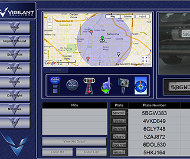Police and private companies link facial recognition software to databases that track motorists.
 The leading suppler of automated license plate reader technology in the US (ALPR, also known as ANPR in Europe) is expanding its offerings to law enforcement. Vehicle owners have already had their movements tracked by the company Vigilant Solutions, which boasts 2 billion entries in its nationwide database, with 70 million additional license plate photographs being added each month. Now passengers can also be tracked if they hitch a ride with a friend and are photographed by a camera aimed at the front of the car. The Livermore, California-based firm recently announced expanded integration of facial recognition technology into its offerings.
The leading suppler of automated license plate reader technology in the US (ALPR, also known as ANPR in Europe) is expanding its offerings to law enforcement. Vehicle owners have already had their movements tracked by the company Vigilant Solutions, which boasts 2 billion entries in its nationwide database, with 70 million additional license plate photographs being added each month. Now passengers can also be tracked if they hitch a ride with a friend and are photographed by a camera aimed at the front of the car. The Livermore, California-based firm recently announced expanded integration of facial recognition technology into its offerings."The new Vigilant Mobile Companion app expands the benefits of license plate recognition and facial recognition technologies to all areas of the agency," a Vigilant Solutions press release claimed. "Using many of the new analytic tools that Vigilant has released in its Learn product over the last couple of years, the app makes these tools even more easy to use and accessible on a mobile device. The app also features Vigilant's Facesearch facial recognition which analyzes over 350 different vectors of the human face."
Though primarily intended for fixed security camera installations, the software could allow police to identify the occupants of vehicles when the system is supplied with a clear photograph of a car's interior. In states such as California and Arizona where red light cameras and speed cameras photograph the front of a car, the video stream can be analyzed in "near real time" to catalog and identify the driver and anyone in the passenger seat of passing vehicles, flagging any "person of interest."
The US District Court for the Eastern District of Virginia recently acknowledged the ability of standard ANPR systems to track a vehicle using the Vigilant Solutions online database that goes by the name National Vehicle Location Service, which has been fed with license plate images from law enforcement and private sources since 2008.
"A subsequent investigation revealed that a 2012 black Range Rover is registered to Eduard," the court wrote on December 17 in the case United States v. Loz. "A search of the National Vehicle Location Service's database also showed that this Range Rover had been spotted eight times near the closest intersection to Eduard's Forest Hills residence."
Only a handful of states have laws in place to regulate automated license plate reader technology.
http://www.thenewspaper.com/news/46/4602.asp
Gmail blocked in China
Google’s Gmail was blocked in China after months of disruptions to the world’s biggest email service, with an anti-censorship advocate suggesting the country’s “great firewall” was to blame.
Large numbers of Gmail web addresses were cut off in China on Friday, according to GreatFire.org, a China-based freedom of speech advocacy group. Users said the service was still down on Monday.
“I think the government is just trying to further eliminate Google’s presence in China and even weaken its market overseas,” said a member of the group who uses a pseudonym. “Imagine if Gmail users might not get through to Chinese clients. Many people outside China might be forced to switch away from Gmail.”
Google’s Transparency Report, which shows real-time traffic to Google services, displayed a sharp dropoff in traffic to Gmail from China on Friday.
“We’ve checked and there’s nothing wrong on our end,” a Singapore-based spokesman for Google said in an email.
Almost all of Google’s services have been heavily disrupted in China since June, but until last week Gmail users could still access emails downloaded via protocols like Imap, SMTP and Pop3 that let people communicate using Gmail on apps like the Apple iPhone’s Mail and Microsoft Outlook.
China maintains tight control over the internet, quick to act against any signs of dissent or challenges to the ruling Communist party’s leadership.
The country has the world’s most sophisticated internet censorship mechanism, known as the “great firewall of China”. Critics say China has stepped up its disruption of foreign online services like Google over the past year to create an internet cut off from the rest of the world.
The Google disruption began in the runup to the 25th anniversary of the government’s bloody crackdown on pro-democracy demonstrators around Beijing’s Tiananmen Square in June 1989.
Gmail’s setback could make email communication difficult for companies operating in China that use Google’s Gmail for their corporate email system, said GreatFire.
Chinese foreign ministry spokeswoman Hua Chunying said she did not know anything about Gmail being blocked, adding that the government was committed to providing a good business environment for foreign investors.
“China has consistently had a welcoming and supportive attitude towards foreign investors doing legitimate business here,” she said. “We will, as always, provide an open, transparent and good environment for foreign companies in China.”
One popular way for companies and people to get around China’s internet censorship is to use a Virtual Private Network (VPN) that allows unhindered access to blocked sites and services.
“It’s becoming harder and harder to connect and do work in China when services like Gmail are being blocked,” said Zach Smith, a Beijing-based digital products manager at City Weekend magazine. “Using a VPN seems to be the only answer to doing anything these days online in China.”
http://www.theguardian.com/world/2014/dec/29/google-gmail-blocked-china-great-firewall
No comments:
Post a Comment